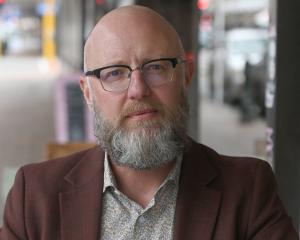
She and her mother are desperate for help and Dunedin South MP Clare Curran is demanding answers. Ms Wilkie, her mother and doctor all agree she is seriously ill and needs help.
Doctors referred Ms Wilkie to Ashburn Clinic — a specialist facility in Dunedin treating people with mental illness and addiction issues — in October last year.
"She has a long and turbulent history and her recent years have been dominated by most severe OCD [obsessive compulsive disorder] which is currently highly disabling and distressing for her," consultant psychiatrist Richard Mullen wrote in his referral letter.
Ashburn Clinic replied to Dr Mullen on November 9. Dr Brett Ferguson noted Ms Wilkie had had a previous and unsuccessful stint at Ashburn Clinic, but that she had not been given a proper trial of Ashburn’s therapeutic community approach.
"The fact that her problems are severe and longstanding does, of course, lead to questions around limitations of how well she can get," Dr Ferguson said.
"If between Michelle and yourselves you consider that a trial of inpatient treatment at Ashburn Clinic would be an appropriate treatment option for her, then I would certainly be supportive of this."
However, Dr Ferguson warned Ms Wilkie was likely to be placed on a waiting list.
Fourteen months later, Ms Wilkie, who has a history of eating disorders, as well as complex mental health issues, is still waiting.
She remains troubled by OCD, complex post-traumatic stress disorder and other mental disorders, as well as paranoia so severe that for 11 years she was unable to leave her home without a trusted support person, usually her mother.
Ms Wilkie cannot feed herself, and her anxiety issues mean she is unable to even pour herself a glass of water without reassurance.
"None of the drugs ever work," Ms Wilkie said.
"They haven’t helped me get out of the house. I still have all my phobias and paranoias. I can’t do anything for myself at all."
The main burden of caring for her had fallen on her mother, and the strain she was under was immense, Ms Wilkie said.
In June, Ms Wilkie and her mother approached Ms Curran for help. She wrote to the Southern District Health Board and last week wrote again.
"This is a family in crisis, and while I accept that it is difficult to predict when a placement at Ashburn will be available, a solution must be found to ensure the welfare of both Michelle and her mother."
SDHB chief executive Chris Fleming wrote to Ms Curran on Tuesday, and said the mental health team was aware of the frustration felt by Ms Wilkie and her mother.
"Although we agree an admission to Ashburn Clinic sooner rather than later is preferable, we are unable to influence the wait time," the letter said.
"There are no viable alternative facilities available."
For Ms Wilkie, her priority was to get well and reclaim her life.
"All my friends have got lives, babies. I had dreams at 21 that I wanted to be singing and dancing and acting. All I do is spend all day crying on the couch and feeling beside myself: I can’t do anything."
SDHB mental health medical director Brad Strong said in a statementAshburn Clinic was a private facility and could be accessed privately at any time.
"The Ministry of Health also funds a limited number of beds at the facility for patients from across the South Island," Dr Strong said.
"The DHB cannot influence when a publicly funded bed may become available or how long an individual may wait for these services."
Comments
It is heartbreaking that Michelle is not getting the treatment she needs and deserves, especially since OCD, no matter how severe, is treatable. My son had OCD so severe he could not even eat, and thankfully exposure and response prevention (ERP) therapy, the first line psychological treatment for OCD, literally saved his life.Today he is a young man living life to the fullest. I recount my family's story in my critically acclaimed book, Overcoming OCD: A Journey to Recovery (Rowman & Littlefield, January 2015) and discuss all aspects of the disorder on my blog at www.ocdtalk.wordpress.com. There truly is hope for all those who suffer from this insidious disorder and I wish Michelle and her family all the best as they work toward getting help for her.
It's called putting people through hoops. Debate and negotiation before an unwell patient is accepted. It is wrong.
However, I'm wondering if the supervising doctor knew his letter had been referred to the Press.












